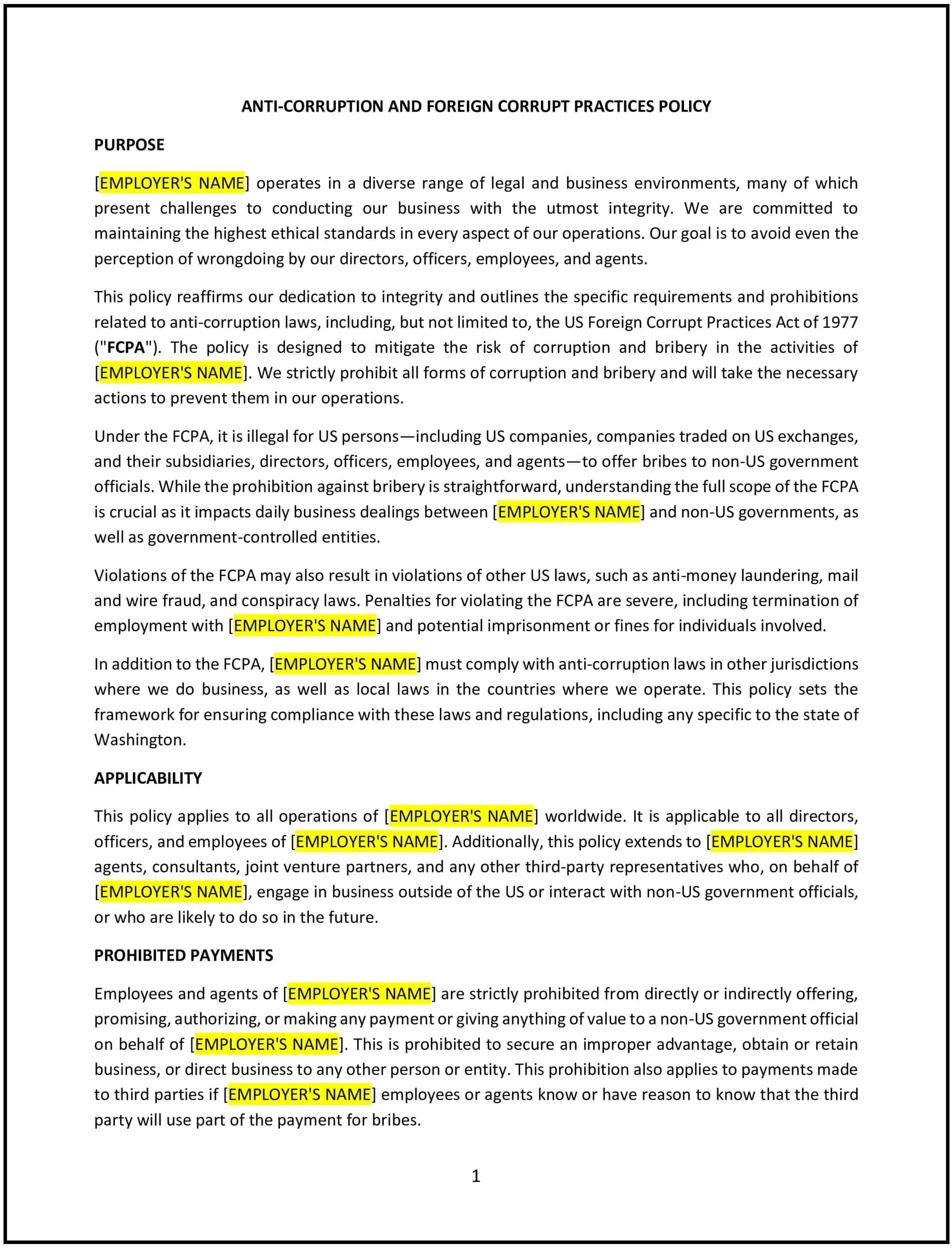Anti-corruption and foreign corrupt practices policy (Washington): Free template
Got contracts to review? While you're here for policies, let Cobrief make contract review effortless—start your free review now.

Customize this template for free
This anti-corruption and foreign corrupt practices policy is designed to help Washington businesses comply with anti-corruption laws, including the Foreign Corrupt Practices Act (FCPA), and prevent corruption, bribery, and unethical conduct within the workplace. The policy outlines the company’s zero-tolerance stance on bribery and corruption, provides guidance on acceptable business practices, and establishes procedures for reporting suspected violations. It aims to ensure that all business operations are conducted transparently and ethically while adhering to the highest standards of corporate governance.
By adopting this policy, businesses can reduce the risk of corruption, improve compliance with anti-corruption regulations, and promote a culture of ethical business conduct.
How to use this anti-corruption and foreign corrupt practices policy (Washington)
- Define corruption and bribery: Clearly define what constitutes corruption and bribery under the policy. This includes offering, receiving, or soliciting anything of value to influence business decisions, either directly or indirectly. The policy should include examples of what constitutes unethical or illegal conduct.
- Establish a zero-tolerance policy: Make it clear that the company has a zero-tolerance policy towards bribery and corruption. Employees, agents, and third parties must not offer or accept bribes, kickbacks, or any other form of corrupt payment or benefit.
- Set expectations for third-party relationships: Define the company’s expectations regarding interactions with third parties, including suppliers, agents, and business partners. The policy should clarify that third parties are expected to comply with the same anti-corruption standards as the company itself.
- Provide guidelines for gifts and entertainment: Establish guidelines on the giving and receiving of gifts, meals, and entertainment. The policy should specify that such activities should be reasonable, transparent, and not intended to influence business decisions.
- Set up a reporting mechanism: Employees should be encouraged to report any suspected violations of the policy. The policy should include clear reporting channels, such as a confidential hotline, email, or direct contact with HR or compliance officers. Ensure that employees are protected from retaliation when reporting concerns in good faith.
- Implement training and awareness programs: Regular training sessions should be conducted to ensure that employees understand the policy and are aware of the risks associated with bribery and corruption. The policy should outline the frequency and format of training programs.
- Ensure compliance with Washington state and federal laws: The policy should comply with Washington state laws, federal anti-corruption regulations, and international standards, including the Foreign Corrupt Practices Act (FCPA) and the UK Bribery Act, as applicable.
- Review and update regularly: Periodically review and update the policy to ensure it remains compliant with Washington state laws, federal regulations, and any changes in the company’s operations or regulatory requirements.
Benefits of using this anti-corruption and foreign corrupt practices policy (Washington)
This policy offers several benefits for Washington businesses:
- Promotes ethical business practices: By establishing clear guidelines for ethical conduct, businesses can foster a corporate culture of integrity and transparency, reducing the likelihood of unethical behavior.
- Reduces legal risks: The policy helps businesses comply with anti-corruption laws, including the Foreign Corrupt Practices Act (FCPA) and Washington state regulations, reducing the risk of legal action, fines, and reputational damage.
- Enhances reputation: A commitment to anti-corruption practices enhances the company’s reputation as an ethical, trustworthy business partner, which can improve relationships with customers, suppliers, and other stakeholders.
- Protects employees and the company: By establishing a clear framework for addressing corruption, businesses protect employees from being placed in compromising situations and safeguard the company’s assets and operations.
- Increases employee trust: Employees who understand that the company has a strong anti-corruption policy are more likely to feel confident in the company’s commitment to doing business ethically and are more likely to report any concerns they have.
- Supports legal compliance: The policy helps businesses ensure compliance with Washington state laws, federal regulations, and international anti-corruption standards, minimizing the risk of legal violations and penalties.
Tips for using this anti-corruption and foreign corrupt practices policy (Washington)
- Communicate the policy clearly: Ensure that all employees are aware of the anti-corruption and foreign corrupt practices policy and understand their responsibilities regarding bribery, gifts, and conflicts of interest. Include the policy in the employee handbook and review it during onboarding or regular training sessions.
- Conduct regular training: Provide training to employees on anti-corruption practices, ethical decision-making, and how to recognize and avoid corruption risks. The policy should specify the frequency and format of training sessions to ensure that employees stay informed and compliant.
- Establish a clear reporting process: Make sure employees know how to report concerns about potential corruption or bribery. The policy should provide multiple reporting options, such as a confidential hotline, direct contact with HR, or access to a compliance officer, and emphasize the company’s commitment to protecting whistleblowers.
- Monitor third-party relationships: Regularly assess third-party relationships, such as suppliers, contractors, and agents, to ensure that they comply with the company’s anti-corruption standards. The policy should include guidelines for conducting due diligence and ensuring that third parties understand and adhere to the company’s ethical expectations.
- Take swift action when violations occur: Ensure that any violations of the anti-corruption policy are investigated promptly and thoroughly. The policy should specify the steps for investigating suspected violations and outline the disciplinary actions that may be taken, including termination or legal action if necessary.
- Review and update regularly: Periodically review the policy to ensure it remains compliant with Washington state laws, federal regulations, and any changes in the company’s operations or global anti-corruption standards. Regular updates will help ensure the policy’s effectiveness and relevance.